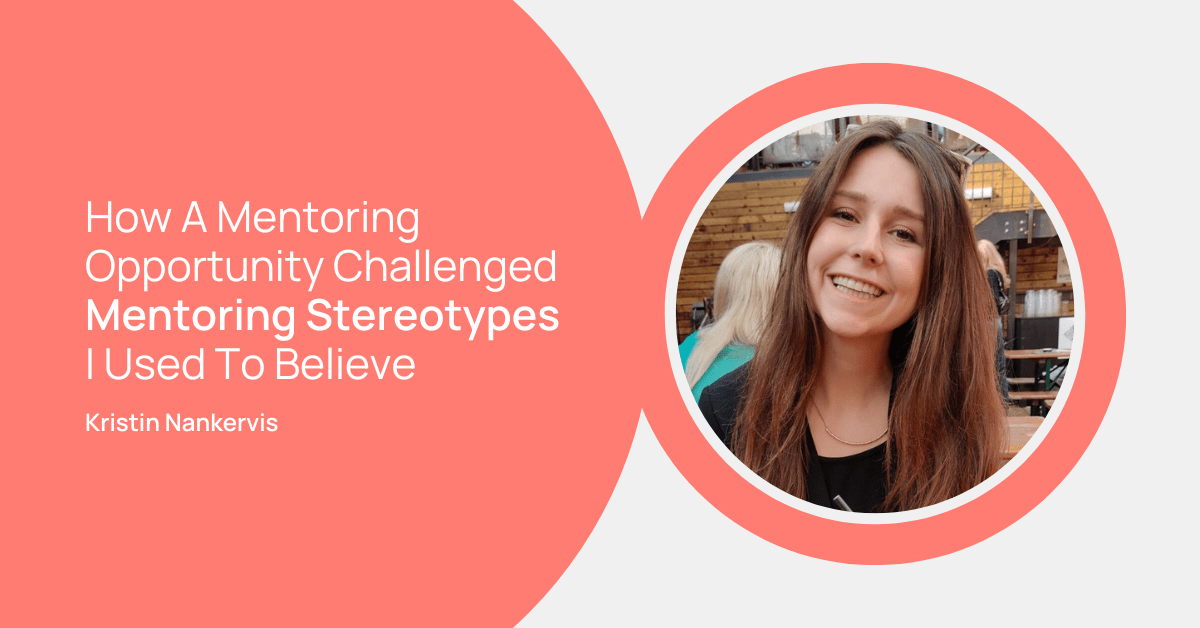Kristin, a member of the Mentorloop Customer Success team, shares her early experiences with mentoring and how a mentoring opportunity challenged the mentoring stereotypes she used to believe.
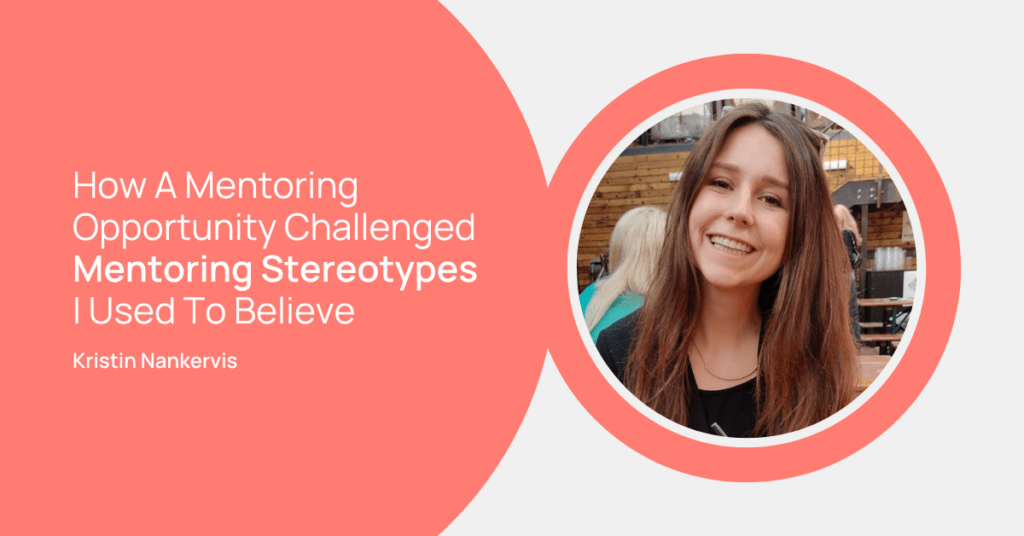
Mentoring comes in different forms. The most important thing that I’ve learned about mentoring so far is that it doesn’t always fit the image you may expect for what mentoring should look like. In fact, being open-minded about mentoring is the most empowering approach you can take. This is what I’ve come to learn after opening myself up to participate in a few mentoring relationships myself. One of the most defining moments of my life so far happened through mentoring – even though I didn’t know that’s what was happening at the time.
Meeting My Mentor
During one of the 2020 lockdowns, I wanted to capitalize on a feeling of motivation to put my energy and focus into personal and professional development. Someone recommended I speak to a family friend who had achieved a super successful career as a business consultant. He’s had great success in building his business from the ground up, being flown around the world by some of the biggest companies in the world to help Senior Leaders and their teams work better together. Needless to say, I was feeling really motivated and itching to get going with some of my own ideas.
However, when I first spoke with him about where I was in my life and the big dreams I had for myself, I was pleasantly surprised by the direction the conversation went. He asked me big questions about who I was as a person and after learning about me, he shared his perspective. Surprisingly, he didn’t advise me to build a business plan or start building my network, as I’d expected. Instead, he advised me to take a breath, slow down, and focus on living more presently.
Being Challenged To Live In The Present
I’d heard the advice to “live more presently” before, in books and podcasts. But hearing it now from someone I knew personally and trusted made a big difference. I wasn’t completely clear on how being present could help me achieve my career development goals, but the future couldn’t be more uncertain at this time, so it was a great time for me to try something new. So, I started practising living in the present more.
I made some changes to my daily habits and behaviours. At work, for example, I began time-blocking. This allowed me to focus on a single task for a set amount of time, thus increasing my productivity. I also implemented more gratitude practice into my day. I noticed how living from a place of gratitude and contentment began to impact my self-esteem and, in turn, my performance at work. I felt more encouraged to step outside my comfort zone and was able to celebrate my wins, no matter how big or small.
And perhaps where I saw the biggest shift for me professionally was that I proactively prioritized taking action over planning. Instead of always thinking about the future and trying to think three steps ahead, I slowed down and took time to focus on the very next step ahead of me. I started doing more and seeing better results.
Being present has enabled me to develop my listening and problem-solving skills, as committing to the present moment allows you to focus solely on the interactions or problems at hand, and you’re therefore better able to pick up on cues from other team members, contribute more value and absorb more knowledge.
I’m someone who naturally spends most of my time planning for the future so this was all quite uncomfortable at first, but the impact it had on me was profound. Knowing how to be fully present has been the most life-changing skill I’ve been able to develop, not just for my professional life, but perhaps more importantly, my personal life.
Whether it’s deadlines or even possible problems that don’t even exist yet, thinking about the future instead of the present task or priority can overwhelm or stress me out. In choosing to live in the present, I learned to sidestep distractions, prioritize taking positive action, and reduce overall feelings of anxiety.
So, despite my expectations and original plan in mind, in the end, that one conversation with a mentor changed the course of my life!
Challenging Traditional Mentoring Stereotypes
There’s a traditional narrative around mentoring that has upheld a lot of old stereotypes. For example, that mentoring is reserved for a select group of people, and that it’s a relationship that is formed behind closed doors. This old-school narrative positions mentors as “high up” individuals who tick every box and have all the answers while mentees are there to listen and reap all the benefits.
There are many more stereotypes about mentoring and I’ve found them to be untrue.
Stereotype 1: Mentoring is for the bold and must be reserved for a select group of people
Mentoring is a learning and development experience that should be accessible to everyone.
Mentoring opportunities should be equally available for those who are looking for a long-term mentoring relationship to help navigate the career “ladder” or those who may just need targeted guidance on a particular challenge.
Stereotype 2: Mentors have all the answers and are there to tell mentees what to do
Mentoring is not a means for mentors to simply dictate actions or strategic advice. Sure, they may have some great suggestions, but at the end of the day, they are there to help mentees find their own way.
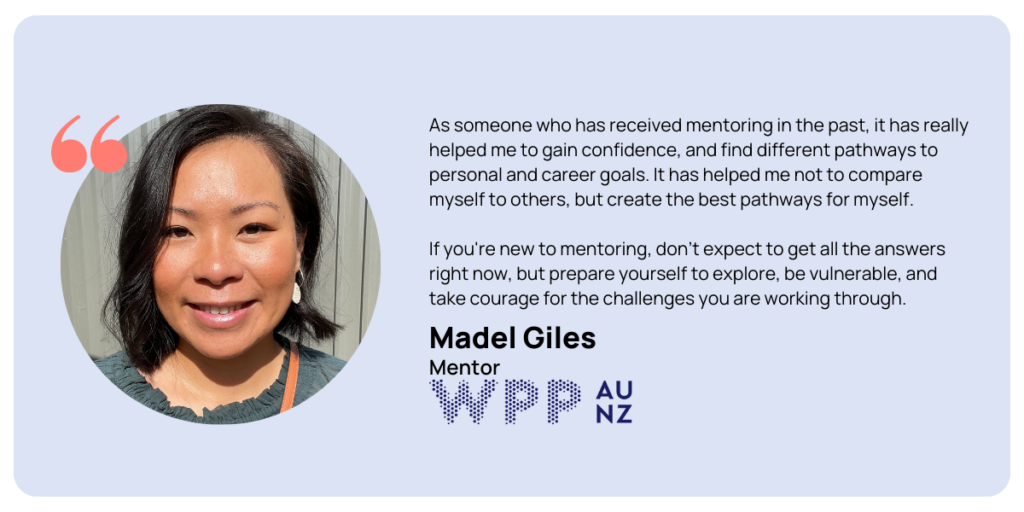
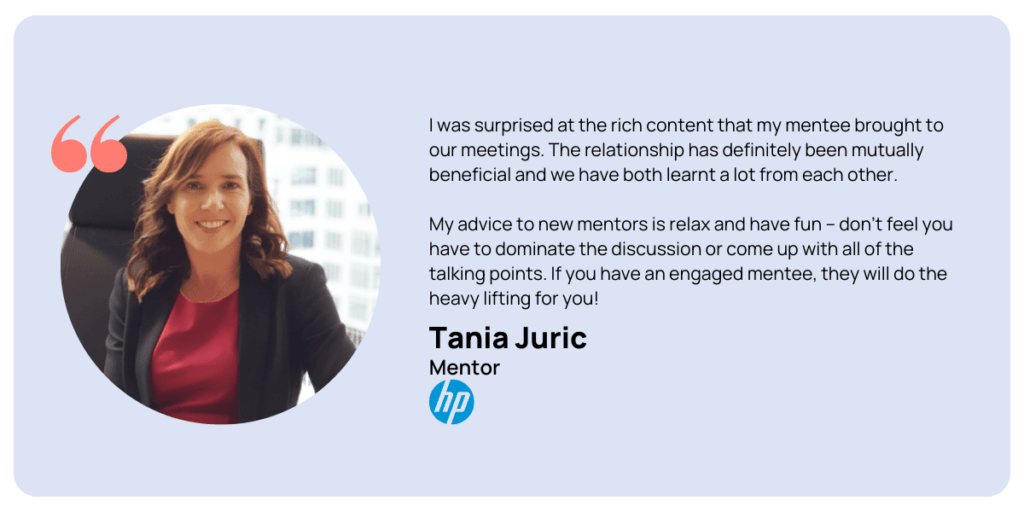
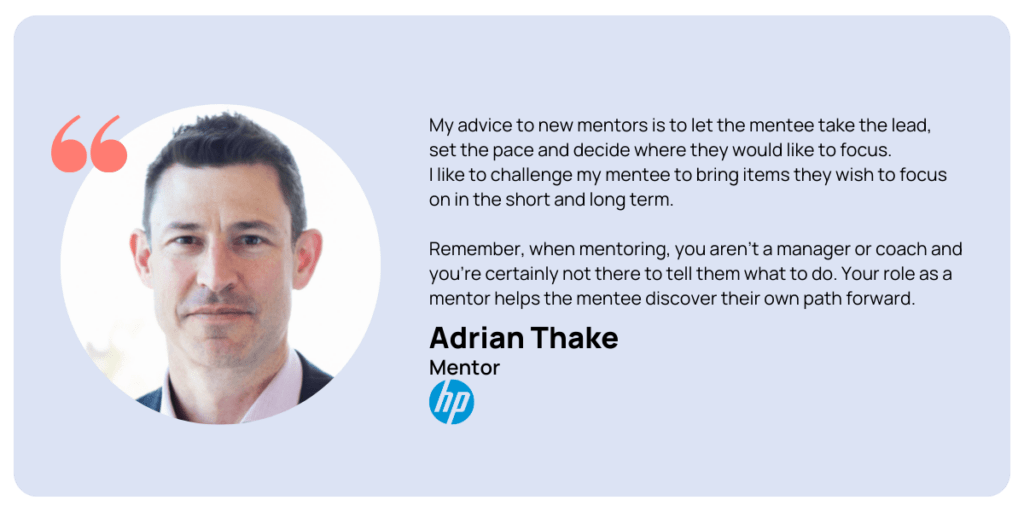
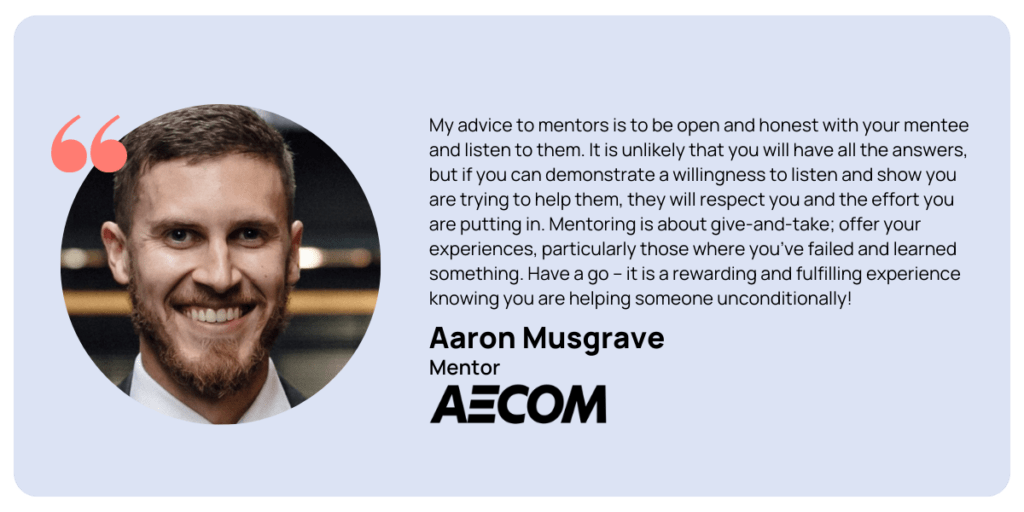
Stereotype 3: Only mentees benefit from a mentoring relationship
This perception also frames mentoring as an endeavour that is a chore or a sacrifice for mentors as they receive zero benefit from it. And this is simply not true. There are many benefits for mentors, among them being the opportunity to keep in touch with those who are new in your industry and improve leadership skills and other soft skills.
When we consider that mentoring is, at its core, a human connection, we start to embrace it as a two-way relationship through which both parties can get something from the experience.
But you don’t have to take it from us, we’ll let mentors Anita and Justin tell you.
Stereotype 4: Mentoring relationships are rare because you need to find a perfect match
There’s no such thing as a perfect match. You can’t possibly learn all you need to learn from a single human being. This is why it’s so important to approach mentoring relationships with an open mind – everyone has something to teach and everyone has something to learn.
So, if you’re matched with someone with a completely different experience technically to the career path you’re working towards, don’t write this person off. This might be a great opportunity to practice or learn some soft skills like active listening, or getting some help development done in areas beyond the walls of the workplace.
Also, think about other areas of your skill set. Think more soft skills than hard skills. Ask yourself if this could be a good opportunity to improve your people skills, expand your network, or be a better listener. Is this an opportunity to learn how to be more empathetic, patient, or accommodating to different perspectives? Remember that the lessons you learn from your mentoring relationship don’t have to be limited to things you’ll definitely use in your job. It can just be lessons that can help you be a more well-rounded person overall.
Stereotype 5: Being a mentee or mentor is only about correcting mistakes or working on weaknesses
I’ve learned that mentoring isn’t just about becoming aware of and working on your weaknesses. It can also be about learning how to celebrate your wins and identifying and playing to your strengths – both confidence-building exercises that I think everyone’s professional and personal lives can benefit from.
I was lucky enough to join a company straight out of university that had a formal mentoring program. Although the structure fit a more stereotypical one – senior mentor + junior mentee – the experience was far from what I expected. It took me a while to come around to being vulnerable with my mentor. (This is completely normal, by the way! It can take time to build trust and open up in your mentoring relationships)
However, once I started being more honest with myself and my mentor, that’s when I started to see real progress. The mentoring had started with me coming to every meeting with all the things that had gone wrong that week, or all the things that hadn’t happened yet but I was worrying about going wrong. Now, I know it’s important to practice self-reflection and determine areas for improvement. And my mentor, Erin, was great in holding me accountable for learning from the things that hadn’t gone so well. But the biggest impact she made was helping me shift my mindset to a more positive place. This was instrumental in helping me take empowered action.
A great takeaway I got from that relationship was to write a “ta-dah list” for every “to-do list”. A “ta-dah list” is a list of achievements, big or small, from that day, week or month. What’s gone well? Where have I performed really well? What are my biggest strengths? It helps keep me positive and focused, not just on what hasn’t gone perfectly, but also on what has gone well and how I can build from what I do well.
Ultimately, mentoring is most meaningful when the individual experiencing it is open-minded. Instead of being held back by stereotypes or expectations that end up limiting you and your development, I encourage you to keep in mind the bigger picture – think more about the why and less about the how. Only once I was able to let go of my expectations of mentoring and embrace life’s learning moments in all its forms, was I truly able to reap the benefits of mentoring.

